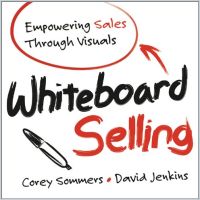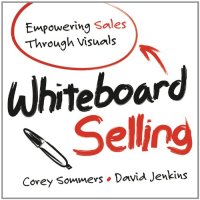Why did I choose this resource?
I chose this resource to learn about the advantages of using a whiteboard for sales presentations.
What did you learn from it?
I learned that using whiteboards during a sales pitch is a great way to keep your prospects engaged, create a memorable presentation, and increase your chances of closing the sale.
Key Knowledge
- No More Slides
- Unable to alter efficiently last minute
- Boring
- Not interactive
- Not memorable
- Telling the Story
- Using whiteboards
- keeps the prospects interest;
- offers “progressive disclosure;”
- engages the prospect;
- Basic Sales Steps
- Listen
- Diagnose
- Ask questions
- Consult
- Adapt
- Using whiteboards
- Basic Types of Whiteboards
- “Qualification and discovery whiteboards”
- Use first to asses lead, define prospect needs, and confirm your offering is a good fit.
- Why change, Why now, Why us whiteboards
- Prove to the prospect the negative side of not buying
- Demonstrate partnership with writing the prospect name next to your Company name.
- Top third of the board, why change pitch, exemplify with details about the marketplace.
- Second third of the board, why now pitch, connect prospects current circumstances to their goals.
- Final third of the board, why us pitch, emphasize your successful history with metric to prove it.
- “Competitive” whiteboards
- Demonstrate the advantages of your product compared to others like it
- “Business-case whiteboards”
- Illustrate payment options and the benefits in terms of ROI.
- Used if unable to close after your competitive whiteboard
- “Closing whiteboards”
- Conclusion board used when another approval is necessary after it’s evident you are the best option.
- “Qualification and discovery whiteboards”
- Other Types of Whiteboards
- “Level Set Wheel”
- Present circumstances, opportunities, challenges, and product/service solution to challenges
- “Day-in-the-Life”
- Illustrates a first person perspective of the company’s struggles.
- “Level Set Wheel”
- Making Whiteboards Work for You
- Use the whiteboard to tell a story using words and visuals.
- Use “grabbers”
- Numbers that increase in value as the narrative develops.
- Draw a “wall of challenges”
- Present solutions to obstacles.
- Must have “break points”
- “Interaction points”
- “Confirmations”
- Ask open-ended questions
- “Objection reframes”
- Use “Competitive Retrofit” approach
- Respond to prospect inquiries with “competitive differentiators”
- ALWAYS have evidence to support your “value delivered” statements.
- Closing the Sale – Techniques
- “Assumptive close”
- Incorporate statements that imply you already have the sale.
- Ex: Would you like us to create the mobile app as well?
- Incorporate statements that imply you already have the sale.
- “Alternative close”
- Offer choices that presume a close
- Ex: Would you like that in blue or red?
- Offer choices that presume a close
- “Trial close”
- Coax the prospect to concur the product/service is the best option with a question
- Ex: This is a compelling resolution, don’t you agree?
- Coax the prospect to concur the product/service is the best option with a question
- “Assumptive close”
- Prepare Your Team and Design Your Whiteboards
- One story per whiteboard
- Use different colors
- Do not erase whiteboard until the story is complete
- Each whiteboard should consist of 6-12 steps
- No more than 90 seconds to explain each step
- Limit yourself to 75 words and 10-12 visuals
- Keep the presentation interactive!
How are you using what you learned?
I am using what I learned to create ideas for using whiteboards to see our products and services.
Key Changes / Key Actions
- Create a whiteboard presentation.
- Present to team members and receive feedback.
Source
- Name : Whiteboard Selling
- Author : Corey Sommers and David Jenkins
- getAbstract.com: Link to Book


